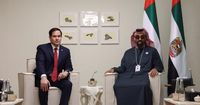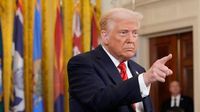The United Arab Emirates has made a groundbreaking commitment to invest $1.4 trillion into the U.S. economy over the next decade, following a pivotal meeting between President Donald Trump and Sheikh Tahnoon bin Zayed Al Nahyan, the UAE's national security adviser. The announcement, made by the White House on March 21, 2025, reflects both nations' strengthened ties and the UAE's strategic push towards diversification beyond oil dependency.
The agreement, reached after a meeting that occurred between March 17 and March 20, 2025, aims to substantially increase existing UAE investments across key sectors, particularly in AI infrastructure, semiconductors, energy, and American manufacturing. According to a White House official, "This new framework will substantially increase the UAE's existing investments in the U.S. economy in AI infrastructure, semiconductors, energy, and American manufacturing." This highlights the UAE's commitment to play a significant role in shaping technological advancements and energy production in the U.S.
During the high-profile discussions, Trump and Sheikh Tanoon, who has proven influential in fostering economic relations, explored various opportunities for collaboration. Sheikh Tanoon, who also leads the UAE investment fund ADQ and several other entities, discussed long-term strategic partnerships. Such partnerships have become increasingly vital as the UAE seeks to solidify its image as a global leader in innovative sectors.
Importantly, this deal isn't merely about numbers. The investment framework is intended to boost high-tech industries, with the announcement also detailing an ambitious project by Emirates Global Aluminium, which plans to construct the first aluminum smelter in the U.S. in 35 years. This smelter is projected to nearly double U.S. domestic aluminum production, signaling a significant operational investment that could affect both market prices and supply chains.
Moreover, this substantial influx of capital represents the culmination of years of growing ties between the UAE and the U.S., particularly during Trump's administration. Wealth funds from the Emirates have already invested in various American assets, reinforcing the economic interconnectedness that characterizes this relationship. Bastions of investment, such as the $200 million allocated by Emirati wealth funds to Kushner's private equity firm, exemplify how intertwined the two nations have become.
In the wake of the announcement, the details of the investment strategy reveal a clear intention to not only enhance technological uptake but also to establish a framework that favors a bilateral approach towards energy and manufacturing. Ventures such as the Emirates Global Aluminium project speak directly to this aim while creating new jobs and infrastructure in the U.S.
Historically, the UAE has long sought to diversify its economy, reducing reliance on oil revenue. President Sheikh Mohamed bin Zayed Al Nahyan's previous interactions with President Biden also reflect a foundation for deeper cooperation in various fields, including space exploration and AI technologies. The September 2024 meeting between the two leaders set the stage for current investments, fostering a strategic alignment in policy and economic interests.
In fact, the increase in UAE's investment capacity supports a continuation of this trajectory, enabling both countries to bolster their political alignments while catalyzing economic growth. During their dinner discussions, Vice President JD Vance and key cabinet members echoed feelings of optimism regarding UAE investments, encouraging inclusive participation from Emirati firms in various sectors.
As American and Emirati officials articulate their economic ambitions, it is clear that the stakes are high for both nations. The focus on high-growth sectors stands to benefit from a consolidation of interests, as exemplified by the mutual plans for the energy framework touted by UAE’s sovereign wealth funds and U.S. private equity partnerships. Such initiatives also align with efforts to support climate measures through significant investments in infrastructure and energy alternatives.
Lastly, as the geopolitical landscape continues to shift, the commitment of $1.4 trillion signals not only an economic alliance but also a broader strategy for both the UAE and the U.S. to navigate global market dynamics and establish stronger footholds in innovative technologies. Looking forward, these developments may set a precedent for similar international partnerships and investments.



